Srdjan Vesic
Rejecting Arguments Based on Doubt in Structured Bipolar Argumentation
Feb 03, 2026Abstract:This paper develops a new approach to computational argumentation that is informed by philosophical and linguistic views. Namely, it takes into account two ideas that have received little attention in the literature on computational argumentation: First, an agent may rationally reject an argument based on mere doubt, thus not all arguments they could defend must be accepted; and, second, that it is sometimes more natural to think in terms of which individual sentences or claims an agent accepts in a debate, rather than which arguments. In order to incorporate these two ideas into a computational approach, we first define the notion of structured bipolar argumentation frameworks (SBAFs), where arguments consist of sentences and we have both an attack and a support relation between them. Then, we provide semantics for SBAFs with two features: (1) Unlike with completeness-based semantics, our semantics do not force agents to accept all defended arguments. (2) In addition to argument extensions, which give acceptable sets of arguments, we also provide semantics for language extensions that specify acceptable sets of sentences. These semantics represent reasonable positions an agent might have in a debate. Our semantics lie between the admissible and complete semantics of abstract argumentation. Further, our approach can be used to provide a new perspective on existing approaches. For instance, we can specify the conditions under which an agent can ignore support between arguments (i.e. under which the use of abstract argumentation is warranted) and we show that deductive support semantics is a special case of our approach.
Can LLMs Judge Debates? Evaluating Non-Linear Reasoning via Argumentation Theory Semantics
Sep 19, 2025
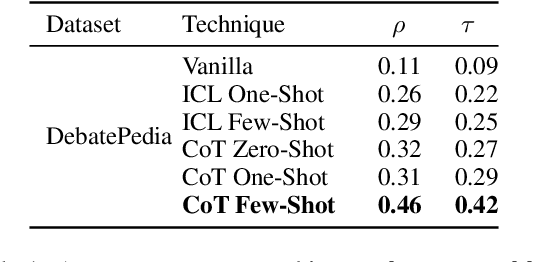
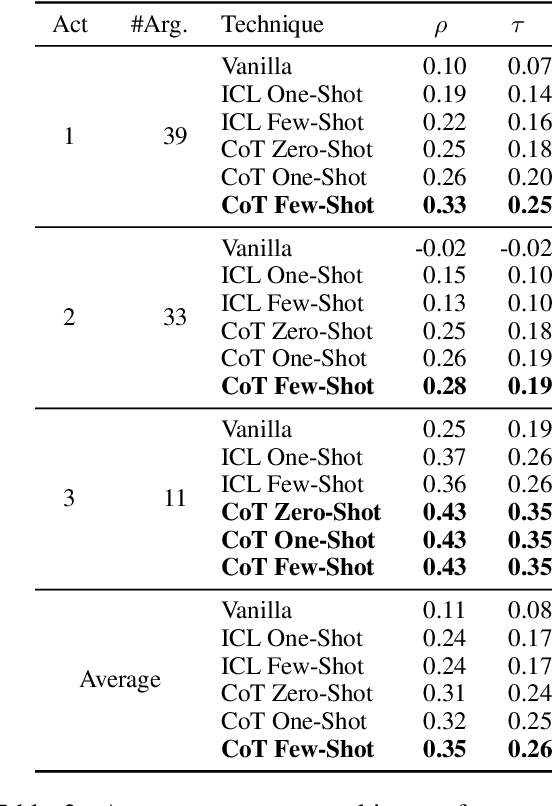
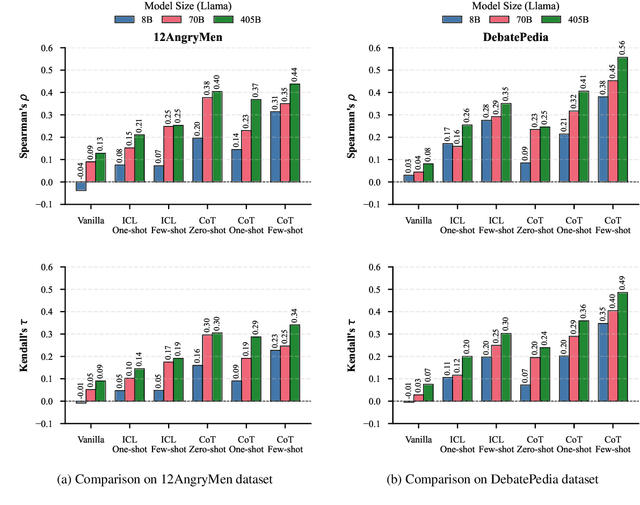
Abstract:Large Language Models (LLMs) excel at linear reasoning tasks but remain underexplored on non-linear structures such as those found in natural debates, which are best expressed as argument graphs. We evaluate whether LLMs can approximate structured reasoning from Computational Argumentation Theory (CAT). Specifically, we use Quantitative Argumentation Debate (QuAD) semantics, which assigns acceptability scores to arguments based on their attack and support relations. Given only dialogue-formatted debates from two NoDE datasets, models are prompted to rank arguments without access to the underlying graph. We test several LLMs under advanced instruction strategies, including Chain-of-Thought and In-Context Learning. While models show moderate alignment with QuAD rankings, performance degrades with longer inputs or disrupted discourse flow. Advanced prompting helps mitigate these effects by reducing biases related to argument length and position. Our findings highlight both the promise and limitations of LLMs in modeling formal argumentation semantics and motivate future work on graph-aware reasoning.
Impact Measures for Gradual Argumentation Semantics
Jul 11, 2024Abstract:Argumentation is a formalism allowing to reason with contradictory information by modeling arguments and their interactions. There are now an increasing number of gradual semantics and impact measures that have emerged to facilitate the interpretation of their outcomes. An impact measure assesses, for each argument, the impact of other arguments on its score. In this paper, we refine an existing impact measure from Delobelle and Villata and introduce a new impact measure rooted in Shapley values. We introduce several principles to evaluate those two impact measures w.r.t. some well-known gradual semantics. This comprehensive analysis provides deeper insights into their functionality and desirability.
The Inverse Problem for Argumentation Gradual Semantics
Feb 01, 2022



Abstract:Gradual semantics with abstract argumentation provide each argument with a score reflecting its acceptability, i.e. how "much" it is attacked by other arguments. Many different gradual semantics have been proposed in the literature, each following different principles and producing different argument rankings. A sub-class of such semantics, the so-called weighted semantics, takes, in addition to the graph structure, an initial set of weights over the arguments as input, with these weights affecting the resultant argument ranking. In this work, we consider the inverse problem over such weighted semantics. That is, given an argumentation framework and a desired argument ranking, we ask whether there exist initial weights such that a particular semantics produces the given ranking. The contribution of this paper are: (1) an algorithm to answer this problem, (2) a characterisation of the properties that a gradual semantics must satisfy for the algorithm to operate, and (3) an empirical evaluation of the proposed algorithm.
Dung's semantics satisfy attack removal monotonicity
Jul 08, 2020Abstract:We show that preferred, stable, complete, and grounded semantics satisfy attack removal monotonicity. This means that if an attack from b to a is removed, the status of a cannot worsen, e.g. if a was skeptically accepted, it cannot become rejected.
Representing Pure Nash Equilibria in Argumentation
Jun 19, 2020



Abstract:In this paper we describe an argumentation-based representation of normal form games, and demonstrate how argumentation can be used to compute pure strategy Nash equilibria. Our approach builds on Modgil's Extended Argumentation Frameworks. We demonstrate its correctness, prove several theoretical properties it satisfies, and outline how it can be used to explain why certain strategies are Nash equilibria to a non-expert human user.
A note on the uniqueness of models in social abstract argumentation
May 09, 2017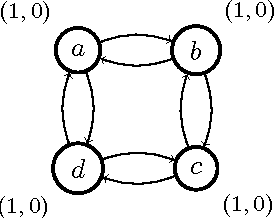

Abstract:Social abstract argumentation is a principled way to assign values to conflicting (weighted) arguments. In this note we discuss the important property of the uniqueness of the model.
A partial taxonomy of judgment aggregation rules, and their properties
Sep 27, 2016
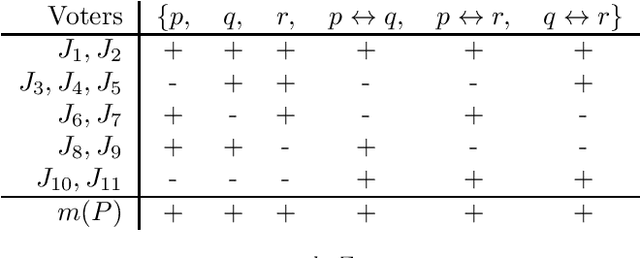


Abstract:The literature on judgment aggregation is moving from studying impossibility results regarding aggregation rules towards studying specific judgment aggregation rules. Here we give a structured list of most rules that have been proposed and studied recently in the literature, together with various properties of such rules. We first focus on the majority-preservation property, which generalizes Condorcet-consistency, and identify which of the rules satisfy it. We study the inclusion relationships that hold between the rules. Finally, we consider two forms of unanimity, monotonicity, homogeneity, and reinforcement, and we identify which of the rules satisfy these properties.
Agenda Separability in Judgment Aggregation
Apr 22, 2016

Abstract:One of the better studied properties for operators in judgment aggregation is independence, which essentially dictates that the collective judgment on one issue should not depend on the individual judgments given on some other issue(s) in the same agenda. Independence, although considered a desirable property, is too strong, because together with mild additional conditions it implies dictatorship. We propose here a weakening of independence, named agenda separability: a judgment aggregation rule satisfies it if, whenever the agenda is composed of several independent sub-agendas, the resulting collective judgment sets can be computed separately for each sub-agenda and then put together. We show that this property is discriminant, in the sense that among judgment aggregation rules so far studied in the literature, some satisfy it and some do not. We briefly discuss the implications of agenda separability on the computation of judgment aggregation rules.
Identifying the Class of Maxi-Consistent Operators in Argumentation
Feb 04, 2014Abstract:Dung's abstract argumentation theory can be seen as a general framework for non-monotonic reasoning. An important question is then: what is the class of logics that can be subsumed as instantiations of this theory? The goal of this paper is to identify and study the large class of logic-based instantiations of Dung's theory which correspond to the maxi-consistent operator, i.e. to the function which returns maximal consistent subsets of an inconsistent knowledge base. In other words, we study the class of instantiations where very extension of the argumentation system corresponds to exactly one maximal consistent subset of the knowledge base. We show that an attack relation belonging to this class must be conflict-dependent, must not be valid, must not be conflict-complete, must not be symmetric etc. Then, we show that some attack relations serve as lower or upper bounds of the class (e.g. if an attack relation contains canonical undercut then it is not a member of this class). By using our results, we show for all existing attack relations whether or not they belong to this class. We also define new attack relations which are members of this class. Finally, we interpret our results and discuss more general questions, like: what is the added value of argumentation in such a setting? We believe that this work is a first step towards achieving our long-term goal, which is to better understand the role of argumentation and, particularly, the expressivity of logic-based instantiations of Dung-style argumentation frameworks.
 Add to Chrome
Add to Chrome Add to Firefox
Add to Firefox Add to Edge
Add to Edge